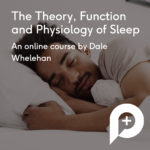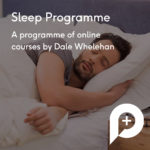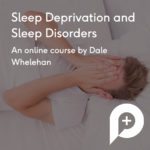Delve deeper into your sleep and find out why sleep affects your practice and the recovery of your patients with Dale Whelehan.
Sleep is an essential part of our daily routine and on average we spend a third of our lives sleeping! There is also evidence that sleep affects almost all types of tissues and systems in the body, and that chronic lack of sleep can increase the risk of non-communicable diseases such as high blood pressure, diabetes, cardiovascular disease, and obesity. Sleep is important for good health!
Sleep is not only important for a healthy life, but also important for safe and effective clinical practice. We have some brand new online courses for you to explain why. Check them out below and never sleep badly again .
Courses & Moderator
These three courses were created and presented by Dale Whelehan, an experienced clinician and graduate student on the effects of sleep on clinical performance. His PhD is taking place at Trinity College Dublin and you can read about his research profile on Research Gate. You can also follow Dale on Twitter.
Sleep program
A good night's sleep is essential to ensure good health and optimal functioning for patients and doctors. In this three-part series, Dale Whelehan will examine the evidence and theories relating to why we need sleep, the physiological processes involved in sleep, how sleep is regulated and measured, sleep disorders, and how sleep deprivation affects health.
Never sleep badly
The courses
Theory, function and physiology of sleep
 Sleep is an important part of our daily routine and we spend about a third of our time sleeping. Good sleep is critical to good health and optimal functioning in our professional capacity. But what is sleep? Why do we need sleep and which physiological processes are involved in sleep? Dale Whelehan discusses these topics in this first course in a three-part series on sleep.
Sleep is an important part of our daily routine and we spend about a third of our time sleeping. Good sleep is critical to good health and optimal functioning in our professional capacity. But what is sleep? Why do we need sleep and which physiological processes are involved in sleep? Dale Whelehan discusses these topics in this first course in a three-part series on sleep.
Why do we need sleep?
How we sleep
 The regulation of sleep can be described by the two-process model of sleep. This model shows us that sleep is controlled by two independent but interrelated processes, the homeostatic sleep drive and the circadian rhythm. In particular, these processes determine the time of sleep, the intensity of sleep and the duration of sleep. Various factors influence the tendency to sleep such as sleep deprivation, time of day and our age. In this course we will examine how sleep is regulated and how we measure sleep and the regulatory processes associated with it.
The regulation of sleep can be described by the two-process model of sleep. This model shows us that sleep is controlled by two independent but interrelated processes, the homeostatic sleep drive and the circadian rhythm. In particular, these processes determine the time of sleep, the intensity of sleep and the duration of sleep. Various factors influence the tendency to sleep such as sleep deprivation, time of day and our age. In this course we will examine how sleep is regulated and how we measure sleep and the regulatory processes associated with it.
Do you speak the language of sleep
Sleep deprivation and sleep disorders
 Sleep is a universal experience and is essential for general health and survival. However, sleep has become a major public health problem as more people become sleep deprived. This course, the third in a series of three sleep courses, examines the effects of sleep deprivation on health and introduces you to the main types of sleep disorders and the effects they can have on our patients' health and our own professional performance.
Sleep is a universal experience and is essential for general health and survival. However, sleep has become a major public health problem as more people become sleep deprived. This course, the third in a series of three sleep courses, examines the effects of sleep deprivation on health and introduces you to the main types of sleep disorders and the effects they can have on our patients' health and our own professional performance.
Learn how sleep affects your practice